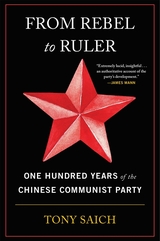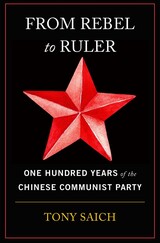
A Project Syndicate Best Read of the Year
On the centennial of the founding of the Chinese Communist Party, the definitive history of how Mao and his successors overcame incredible odds to gain and keep power.
Mao Zedong and the twelve other young men who founded the Chinese Communist Party in 1921 could hardly have imagined that less than thirty years later they would be rulers. On its hundredth anniversary, the party remains in command, leading a nation primed for global dominance.
Tony Saich tells the authoritative, comprehensive story of the Chinese Communist Party—its rise to power against incredible odds, its struggle to consolidate rule and overcome self-inflicted disasters, and its thriving amid other communist parties’ collapse. Saich argues that the brutal Japanese invasion in the 1930s actually helped the party. As the Communists retreated into the countryside, they established themselves as the populist, grassroots alternative to the Nationalists, gaining the support they would need to triumph in the civil war. Once in power, however, the Communists faced the difficult task of learning how to rule. Saich examines the devastating economic consequences of Mao’s Great Leap Forward and the political chaos of the Cultural Revolution, as well as the party’s rebound under Deng Xiaoping’s reforms.
Leninist systems are thought to be rigid, yet the Chinese Communist Party has proved adaptable. From Rebel to Ruler shows that the party owes its endurance to its flexibility. But is it nimble enough to realize Xi Jinping’s “China Dream”? Challenges are multiplying, as the growing middle class makes new demands on the state and the ideological retreat from communism draws the party further from its revolutionary roots. The legacy of the party may be secure, but its future is anything but guaranteed.

“The definitive, candid, and absorbing history of a political organization…A vital account, based on magnificent research, that shows the party as a colossal, relentless, and enduring machine.”—Jane Perlez, former Beijing Bureau Chief, New York Times
“If you were to travel back in time to 1921 and predict that the Communist Party of China would rule over the world’s second-largest economy 100 years later, no one would believe you. In this definitive primer, Tony Saich explains how the impossible came true.”—Yuen Yuen Ang, Project Syndicate
“An extremely lucid, insightful history of the Chinese Communist Party. Saich’s readable narrative takes the CCP from its origins as a tiny group of revolutionaries…to the powerful, repressive rulers of a world power today.”—James Mann, author of The China Fantasy
Mao Zedong and the twelve young men who founded the Chinese Communist Party in 1921 could hardly have imagined that less than thirty years later, they would rule China. Over a century later the party remains in command, leading a nation primed for global dominance.
From Rebel to Ruler is a landmark history of the Chinese Communist Party—its rise against incredible odds, its struggle to consolidate power and overcome self-inflicted disasters, and its ability to thrive long after the collapse of the Soviet Union and dissolution of other communist parties. Leninist systems are thought to be rigid, yet the Chinese Communist Party has proved adaptable. Tony Saich shows that the party owes its endurance to its flexibility. But is it nimble enough to realize Xi Jinping’s “China Dream”? Challenges are multiplying, as a restless middle class makes new demands and the party strays ever further from its revolutionary roots.

What does the Chinese Communist Revolution teach us about the relationship between political discourse and real experiences and events? This unique interpretation of the revolutionary process in China uses empirical evidence as well as concepts from contemporary cultural studies to probe this significant question. David Apter and Tony Saich base their analysis on recently available primary sources on party history, English- and Chinese-language accounts of the Long March and Yan’an period, and interviews with veterans and their relatives.
Written by an eminent political theorist well seasoned in comparative development and an internationally recognized China scholar, and abounding in new approaches to central issues, this incisive analysis will be welcomed by social theorists and China scholars alike.
READERS
Browse our collection.
PUBLISHERS
See BiblioVault's publisher services.
STUDENT SERVICES
Files for college accessibility offices.
UChicago Accessibility Resources
home | accessibility | search | about | contact us
BiblioVault ® 2001 - 2024
The University of Chicago Press









